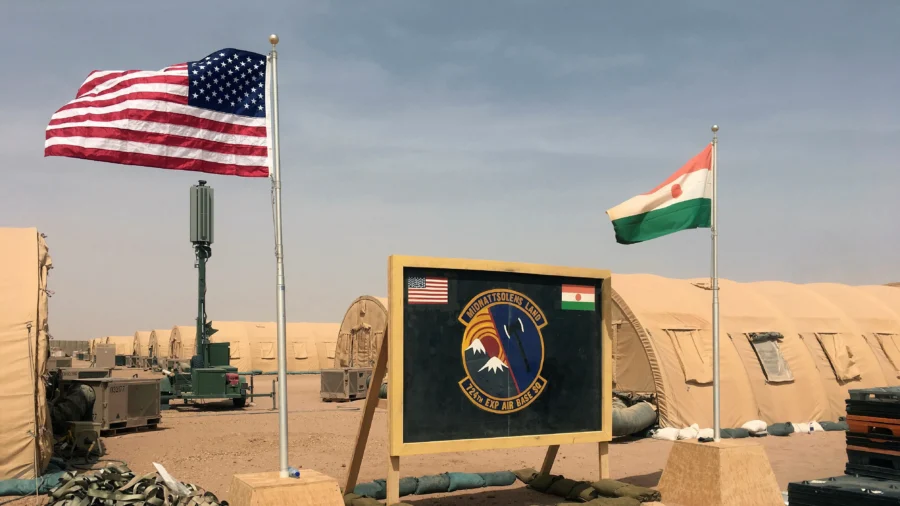The U.S. military is moving ahead with plans to pull troops out of the African countries of Chad and Niger, Pentagon press secretary Maj. Gen. Pat Ryder announced on Thursday.
Chad and Niger have partnered with U.S. forces in the past to combat terrorism and insurgencies in the Sahel, a transitionary region between the Sahara desert of North Africa and Central Africa. Last month, Niger’s military junta government discontinued an agreement that allowed U.S. forces to operate in the country, and neighboring Chad has also begun to question their partnership with the United States.
At a Thursday Pentagon press briefing, Maj. Gen. Ryder announced U.S. Ambassador to Niger Kathleen FitzGibbon and Major General Kenneth Ekman, Director of Strategy, Engagement and Programs for U.S. Africa Command (AFRICOM) had begun meetings in the Nigerien capital of Niamey to the junta government—known as the National Council for the Safeguard of the Homeland or CNSP—to discuss “an orderly and safe withdrawal” of U.S. troops from the country.
“We’ll be sure of course to keep you updated regarding any significant developments. In the meantime, the Department of Defense remains committed to countering violent extremist organizations in West Africa,” the Pentagon spokesman added. “The Department will continue to support whole government approaches, work with African leaders to maintain stability, and address terrorist threats in the region, including addressing core issues that drive insecurity separately as an update.”
Shifting Alliances in Niger
Around 1,000 U.S. troops are currently deployed in Niger. Maj. Gen. Ryder did not provide any updates on the progress of diplomatic meetings with the CNSP, and the timeline remains unclear for exactly when these U.S. troops will leave the country.
The Pentagon spokesman said “I think it’s a safe bet” that current negotiations between U.S. and Nigerien officials will see all U.S. forces depart the country.
The Nigerien junta government, which formed after the Nigerien troops overthrew and detained Nigerien President Mohamed Bazoum in July, already pressed France to pull its troops out of the country last fall.
While working to expel Western forces that have previously been stationed in the country, the CNSP has begun to form partnerships with Russia.
Earlier this month, Russian military trainers arrived to reinforce the country’s air defenses and they brought Russian equipment, which they would train Nigeriens to use.
Relocations From Chad May Be Temporary
Around 100 more U.S. troops are deployed in Chad. Maj. Gen. Ryder indicated talks with Chadian officials are ongoing but may not see all U.S. troops depart the country.
“As I understand it, as talks continue with Chadian officials, US AFRICOM is currently planning to reposition some U.S. military forces from Chad, a portion of which were already scheduled to depart,” the Pentagon spokesman said. “This is a temporary step as part of an ongoing review of our security cooperation, which will resume after Chad’s May 6 presidential election.”
Joint Chiefs Vice Chairman Adm. Christopher Grady said Wednesday that U.S. State and Defense Department officials, and AFRICOM leaders are trying to convince Chad’s government to keep U.S. forces in the country.
He said if a deal can’t be reached, the U.S. military will have to look for other countries to partner with on military operations in the Sahel region. The U.S. military mission has targeted organizations affiliated with the Al Qaeda and ISIS terrorist groups in the region.
“If we are asked to leave, and after negotiations that’s the way it plays out, then we are going to have to recalculate and figure out a new way to do it,” Adm. Grady said.
Speaking on Thursday, Maj. Gen. Ryder said the U.S. military “will continue to consider all options when it comes to accomplishing our [counter-terrorism] mission.”
The Pentagon said it would be preferable, from an accessibility standpoint, to be able to operate in places like Niger and Chad, but that the U.S. military has “other means and methods” it can consider in its regional operations.
The Associated Press contributed to this article.


